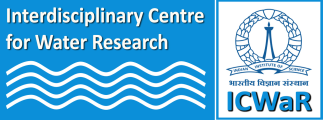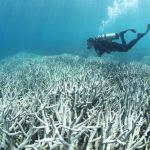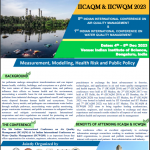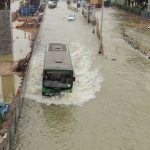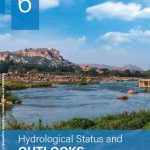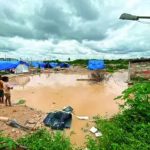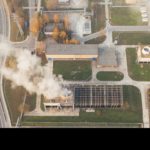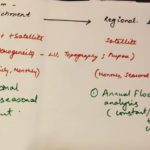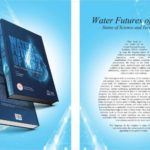ICWAR Seminar Series
|
19 Nov
2020
|

Name of the Speaker: Dr. Utpal Tatu Title of the Seminar: Water sanitation in the times of Covid-19 pandemic Date and Time: 19th November 2020 (Thursday), 4:30 PM Online Platform: MS Teams About the Speaker: Dr. Utpal Tatu is a professor at the Indian Institute of Science He obtained his his PhD from Department of Biochemistry at Indian Institute of Science and pursued his postdoctoral research at Yale School of Medicine, New Haven, Connecticut where he went on to become an Assistant professor His most notable research delves into neglected and emerging infectious diseases with a focus to develop better treatments and diagnostic solutions. His research interests include interface between human, animal and environment with One health concept On going research on amoebiasis, Bebesiosis Candidiasis, Cryptococcosis, Prof. Tatu is keen on applying his expertise in Mass Spectrometry as well as infectious diseases to address global health problems due to contaminated water.
Abstract: Water safety and quality are fundamental problems in underdeveloped and developing countries like India Approximately half of our country’s population practice open defecation and thrive in poor sanitary condition A significant number of communicable diseases in India are due to unsafe water and the lack of hygiene practices Contaminated water results in various gastrointestinal complications, diarrhea being the most common Diarrhea is the third leading cause of childhood mortality in India and is responsible for 13 of all deaths annually in children under 5 years of age. My lab at IISc has been studying neglected and emerging infectious diseases, including various gastrointestinal pathogens. We take into account interactions between humans, animals and their environment to understand the emergence and spread of infectious diseases Our aim is to improve global health by minimizing risks of infection by ensuring clean food, feed, air and water. We have the expertise to address issues of water safety standards and technology to identify undesirable chemical as well as microbiological components in natural water resources. To minimize the burden of deaths caused due to consumption of impure water, a solution would be to develop early and accurate detection and removal of gastrointestinal pathogens such as Giardia, Entamoeba, Cryptosporidium, Salmonella, Shigella, Campylobacter, Shigella toxin producing Escherichia coli and Rotavirus We also monitor the quality standards of natural water resources ground water, rivers, lakes and oceans. By using most sensitive and specific molecular methods such as mass spectrometry we ensure detection of ppb level contaminants in water. |
|
28 Oct
2020
|

Name of the Speaker: Dr. Sharad Kumar Jain Title of the Seminar: Hydrology and Water Resources Management in India – from Ancient to Recent Times Date and Time: 28th October 2020 (Wednesday), 4:00 PM Online platform: MS Teams [link to the video of the seminar] About the speaker: Dr Sharad Jain is currently serving as a Visiting Professor, Civil Engineering Department, IIT Roorkee, India. He has about 38 years R&D experience in the fields of surface water hydrology, water resources systems, environmental flows, and impacts of climate change on water resources. He was the Director, National Institute of Hydrology, Roorkee, India, during 2017-20. Dr Jain was a Post-Doctoral fellow in Japan for one year, Visiting Professor at Louisiana State University, USA, for one year, and NEEPCO Chair Professor at IIT Roorkee (2009-2012). He was also the Director General of National Water Development Agency for a short-term. Dr Jain has co-authored five books, has written 35 book-chapters, about 250 technical papers, and more than 75 technical reports. Dr Jain is a member of Editorial Boards of three reputed technical journals. He was the Chairman of the Expert Appraisal Committee (River Valley and Hydroelectric Projects), MoEF&CC. He is/was member of many scientific committees. Abstract: Water is closely linked with human existence and survival. Relationship between humans and water is unique. Most ancient civilizations, including the Harappan (Indus Valley) civilization, developed and grew in the vicinity of springs, lakes, rivers and oceans. In the struggle for development, the need to carefully manage water propelled the growth of hydrologic science in ancient India. However, most of the knowledge of hydrologic sciences developed by our forefathers remained hidden and unknown to the world at large until the recent times. Based on ancient literature and evidences revealed by the recent explorations, this talk will provide some fascinating glimpses into the hydrological, hydraulic and related knowledge that was developed in ancient India. The talk will also cover the water management activities in different times and describe how the management decisions evolved in different periods in response to the type and magnitude of demands for water, preferences/choices of the society, and available technology at those times. |
|
29 Sep
2020
|

Name of the Speaker: Dr. P. Somasekhar Rao Title of the Seminar: Water Science – Interface with Policy and Governance Date and Time: 29th September 2020 (Tuesday), 4:00 PM Online platform: MS Teams [link to the video of the seminar] About the speaker: Dr. P. Somasekhar Rao is a Doctoral degree holder (Ph.D) in Earth Sciences and has 30 years of working experience in land and water sector having worked with The United Nations Food and Agriculture Organization, Directorate General of International Cooperation, Government of The Netherlands, Asian Development Bank, Government of India and NGOs. Currently working at Government of Karnataka for the past 5 years as Director (Technical) in Water Resources Department. He had partnered with International institutes, National and State Government Departments, Academic Universities, NGOs and Donor Agencies with focus on water and agriculture. Dr. P.S. Rao also has a Masters degree in Business Administration (MBA) from Bharatiya Vidya Bhawan, New Delhi. Dr. Rao worked in China, Uzbekistan, Malaysia, Thailand and Bhutan and travelled widely around the world representing India’s case in a number of international for a such as World Water Forums and a number of Inter-governmental conferences and facilitated participation of farmers in various international meetings and exchange visits with other country farmers. Dr. Rao introduced Modernization of Irrigation Management concepts and methodology in India and enabled setting-up the Advanced Centre for Integrated Water Resources Management (ACIWRM) in Karnataka State and designing an IWRM program in Karnataka to move towards River Basin Management. Dr. Rao was key in developing a new draft State Water Policy for Karnataka and setting up Karnataka Water Resources Information System. Dr. Rao pioneered the concept of Participatory Groundwater Management and developed Farmer Water Schools for groundwater management drawing from the experiences of Farmer Field Schools in Asia. Dr. Rao also supported evolving the Farmer Climate Schools engaging farmers with climate variability issues. Dr. Rao has several scientific and popular articles, technical reports to his credit and majorly brought out two important books on India’s Water Resources and Integrated Water Resources Management (IWRM). Abstract: Science influences society through its knowledge and world view. Scientific knowledge influence the way many individuals in society think about themselves, others, and the environment. Societal challenges often inspire questions for scientific research, and social priorities often influence research priorities through the availability of funding for research. Water is emerging the most essential focus to the future development and economic growth of any region / society. There has been a steady increase in the demand for water use from different sectors such as domestic users – urban and rural, economic sectors – agriculture & allied sectors, services and industry apart from environmental flow requirements. This needs a paradigm shift in planning investments and management of water resources. For effective and sustainable water resources management, several policies have been made in the past – both nationally and at state level, and some are being made and various departments or agencies in the government are assigned with the responsibility of implementing these policies. Some laws are also enacted to implement the policy. The whole gamut of these actions is the governance of water resources. Government of Karnataka committed to create an enabling environment towards achieving water and food security adopting the IWRM principles and approach and had setup a new entity ACIWRM which acts as a think tank to the state Water Resources Department, engaging in policy analysis, research, planning, capacity building and develop the knowledge base to gear up the department to its future vision. How was the water science knowledge harvested for evolving new water policy and what partnerships between government and scientific institutions are playing the major role in bringing in a paradigm shift in perspectives of water resources management. |
|
31 Aug
2020
|
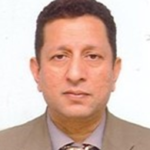
Name of the Speaker: Dr. Bhanu Neupane Title of the Seminar: Can new technologies help achieve water security? Date and Time: 31st August 2020 (Monday), 4:00 PM Online platform: MS Teams [link to the video of the seminar] About the speaker: Bhanu Neupane is trained in Hydrosystems, Water Resources Management and Knowledge Management. He has a PhD in water resources management from Canada and a second Doctorate degree in Business Administration from the International School of Management, France/USA. He started his career as a change agent for a GTZ-funded agricultural inputs project in Eastern Nepal in 1987. He also served as an Agriculture and Natural Resource Management Specialist for a governmental research organisation in Nepal. He joined UNESCO (United Nations Educational, Scientific and Cultural Organisation) as a Programme Specialist in 2000 and served with the UN system-wide World Water Assessment Programme (WWAP). He was made responsible for the implementation of the International Hydrological Programme in South and Central Asia between 2005-2011. Currently he is working for UNESCO as a Programme Manager for ICT and Sciences and Open Access to Scientific Research. He is also working in the area of Open Data, essentially to improve and increase access to scientific data and information. He is also a visiting professor and regularly teaches courses related to knowledge Management, Multi-criteria Decision-Making, Water Resources management, and Disaster Risk Reduction at Universities. Abstract: Technological solutions are transforming water resources management at an unprecedented pace. Management and governance of water resources are being influenced by a simple utilization of low cost intervention – such as a sensors — to the application of Artificial Intelligence (AI) and big data analytics. Such influences are, inter alia, helping to make reliable estimation of freshwater supplies, fostering access to high quality water, improving irrigation efficiencies for food production, and making industrial processes for energy production more sustainable. Technological innovations are also improving assimilation of vast amounts of data and information generated using a variety of platforms, unthinkable a few years ago. The technology aided information integration is contributing to better operation & maintenance, improving quality and management of water resources, thereby fostering their sustainable use and lasting resilience. But what is the global state of play for these issues? Are we inclusive and open in the process? What are the bigger questions? Is the science of hydrology and the data science or AI coevolving? What can be done to bring harmony between the two streams of sciences? |
|
30 Jul
2020
|

Name of the Speaker: Dr. Alan Jenkins Title of the Seminar: Hydrological Outlooks: what can we do and what could we do? Date and Time: 30th July 2020 (Thursday), 4:00 PM Online platform: MS Teams [link to the video of the seminar]
About the speaker: Alan Jenkins is Director of Science at the UK Centre for Ecology Hydrology (UKCEH), the leading UK centre for environmental science across water, land and air. With a background in hydrology, he has worked nationally and internationally on acid rain, water quality, water resources and climate change impacts He currently acts as the UK Hydrological Advisor with the World Meteorological Organisation and Chairs the UK input to the UNESCO Inter Governmental Hydrology Programme. He is leader of the WMO Task Team responsible for the development of the Hydrological Status and Outlook System (HydroSOS). He is also an Honorary Professor in the Lancaster Environment Centre at the University of Lancaster and a Visiting Professor in the Department of Geography, University College London. Abstract: Water related challenges, such as a secure water supply, floods, droughts, and ensuring ecosystem protection and conservation, are growing concerns. Water is consistently identified as one of the highest global risks in terms of impact. These challenges already affect tens of millions of people with estimated costs in the order of magnitude of billions of US dollars and are expected to intensify with future climate change, population growth and increasing economic activities. One of the significant challenges facing societies trying to effectively manage their water resources is a lack of hydrological information products that are targeted to serve the needs of different sectors. This information deficiency is often driven by three key factors: 1) insufficient available of local scale data, 2) a lack of regional to global coherence in hydrological information and modelling systems, and 3) limited dialogue between stakeholders and the multitude of actors which renders the understanding of stakeholders needs regarding the management of water resources unclear. Because of these shortfalls, water managers and stakeholders cannot properly assess the availability of water resources on different spatio-temporal scales nor can they foresee how this availability might change over the near future, thus rendering water management and planning difficult, if not impossible. This talk will focus on current techniques and capabilities for producing sub seasonal to seasonal hydrological outlooks. It will consider what advances are needed to improve the reliability and skill in these outlooks. Lastly, it will consider the difficulties in translating the outlook into actionable messages for stakeholders. |
|
21 Feb
2020
|
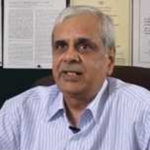
Name of the Speaker: Dr Anil Kulkarni Title of the Seminar: Recent Advances in Himalayan Glaciology [Gallery] Date and Time: 21st February 2020 (Friday), 4:00 PM Venue: Lecture Hall, ICWaR
About the speaker: Dr Kulkarni is currently working as a Distinguished Scientist at Divecha Centre for Climate Change, Indian Institute of Science, Bangalore. He is instrumental in developing numerous remote sensing-based methods and models to understand Himalayan Cryosphere. These are widely used to map seasonal snow cover, glacier cover and moraine-dammed lakes. Further, these also are used to estimate glacier mass balance, stream runoff and to understand the influence of climate change on the Himalayan cryosphere. During his initial investigations, Dr. Kulkarni developed a methodology to map Himalayan glaciers using remote sensing data. This methodology was used to prepare glacier inventory of Indian Himalaya, providing information about the distribution of Himalayan glaciers, not available previously to the scientific community. Dr Kulkarni and his team have recently developed a model based on velocity, slope and flow law to estimate the distribution of ice-thickness. This is being used to estimate glacier stored water and mass loss for Himalayan glaciers. In addition, he is working on modelling Glacier Lake Outburst Floods in Himalaya. He also organises two weeks of training programs on Glaciology. Due to his significant contribution in the field of glaciology, he received numerous awards such as National Geosciences award, Polar science and cryosphere and team leader award from ISRO. Abstract: Himalayan mountain range is one of the major Water Tower of Asia and stores a large concentration of snow and glaciers. Water Towers generate more runoff due to high orographic precipitation and delay release due to storage as snow and Ice. Therefore, water is supplied during the hot and dry season, making many rivers like Indus, Ganga and Brahmaputra perennial. Indus River considered more vulnerable under future climate change scenarios due to large contribution from snow/glacier melt, large population, high water stress and geopolitical conditions. In addition, the livelihood of large Himalayan mountain communities also depends on the availability of water from snow and glacier melt. Therefore, periodic assessment of the state of the Himalayan cryosphere is important. In this lecture, I will give a current understanding of Himalayan cryosphere and future challenges. Recently numerous new techniques and models have been developed to estimate glacier volume, mass loss, potential glacier lake sites, assessment of flash flood from Glacier Lake Outburst Flood and effect of climate change of glacier distribution. I will discuss the significance of these contributions and its impact of water security and livelihood on mountain communities. |
|
28 Jan
2020
|

Name of the Speaker: Dr. Laurent Ruiz Title of the Seminar: Critical Zone Science for Water Resource Management in Agricultural Landscapes [Gallery] Date and Time: 28th January 2020 (Tuesday), 4:00 PM Venue: Lecture Hall, ICWaR
About the speaker: Laurent Ruiz research interest is to understand and model the interactions between climate, anthropogenic forcings, especially agriculture, and water resources at the landscape scale. He explores how pluridisciplinary approaches, spanning Hydrology, Agronomy, Geochemistry and Social Sciences can help conceiving better management of water and nutrient cycles in agro-ecosystems. His work relies primarily on long term observations carried out within Critical Zone Observatories in France (AgrHys https://www6.inrae.fr/ore_agrhys) and in India (BVET https://mtropics.obs-mip.fr/). He holds his PhD from Montpellier University (France) and is a researcher at INRA and IRD. He has been associated with the Indo-French Cell for Water Sciences at IISc Bangalore since 2002. He is the PI of the ATCHA project (http://www6.inrae.fr/atcha/) focused on the adaptation of Indian agriculture to climate change. Abstract: In the time of Anthropocene, global changes are questioning the capacity of the planet Earth to sustain the development of human societies in the long term. In the past two decades, this concern has fostered world wise efforts to develop integrated studies of the “Critical Zone” (CZ), the thin layer of the Earth surface, from the top of the canopy to the bottom of the aquifer, hosting the continental biosphere and providing basic human needs such as water, food, energy and ecosystem services. Critical Zone Observatories (CZO) have been set up in various climatic, geologic and human contexts with a wide range of variables being monitored on the long term. Their main challenge is to ensure the actual integration of the multiple scientific disciplines at stake, from geosciences and biological sciences to social sciences, working within a wide range of spatial and temporal scales. Using experiences from France and India, this seminar will illustrate how such integration can produce the knowledge required for effectively addressing environmental issues in agricultural landscapes. |
|
20 Dec
2019
|

Name of the Speaker: S. Vishwanath Title of the Seminar: The tyranny of small decisions- living with sub-optimality in the water and waster water sector: experience from the field [Gallery] Date and Time: 20th December 2019 (Friday), 4:00 PM Venue: Lecture Hall, ICWaR About the speaker: S Vishwanath is a Civil Engineer and an Urban Planner. He has 33 years of experience in the water, waste-water and sanitation sector helping design rainwater harvesting, aquifer recharge, wastewater recycling and ecosan systems. He is an Adjunct Professor and teaches a course on the theme – Water at the Azim Premji University, Bengaluru, India (http://azimpremjiuniversity.edu.in/SitePages/vishwanath-s.aspx). He is a Trustee with the Biome Environmental Trust (www.biometrust.org). One of the current projects is to help the traditional well-digging community build a million recharge wells for Bengaluru. He used to write a weekly column called Waterwise for the last 12 years for The Hindu (http://www.thehindu.com/profile/author/s.-vishwanath/). He has been part of the expert committee which helped formulate the Rainwater harvesting policy and law for Bengaluru, the Waste-water policy for Karnataka and the Water Policy for Karnataka being drafted by the Karnataka Knowledge Commission. Abstract: The management of water and wastewater is often seen as an institutional issue. Yet in the case of India there are many stakeholders at play apart from institutions and in fact, may crucially be using and in control of more waters and wastewaters than the government. In the quest for sustainable management of resources, optimality is put forward as a goal, whereas a series of sub optimality’s, often in conflict with the optimal, is likely the way forward. How is rainwater harvesting to work in non-optimal worlds? How is groundwater to be used and recharged? What happens to faecal sludge from pit toilets and septic tanks and wastewater in a city ecosystem? Can livelihoods also be included as part of the management of water as a resource? Do policies and standards need a fresh look in this context? Why are we subject to the tyranny of small decisions ? Some examples and experiences from Bengaluru were discussed in the talk. |
|
18 Nov
2019
|
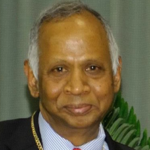
Name of the Speaker: Prof. Murugesu Sivalapalan Title of the Seminar: Mega-trends in the Growth of Hydrologic Understanding: From Newton to Darwin to Wegener [Gallery] Date and Time: 18th November 2019 (Monday), 4:00 PM Venue: Lecture Hall, ICWaR About the speaker: Murugesu Sivapalan holds a B.Sc Civil Engineering (University of Ceylon), M.Eng in Water Resources Engineering (AIT, Thailand), and obtained his 1986 Ph.D from Princeton University. He was Professor of Environmental Engineering at the University of Western Australia for 17 years, before joining University of Illinois in 2005. Siva has published on a wide range of topics, including effects of heterogeneity and scale, flood frequency, eco-hydrology and water balance and water quality modeling. He was Executive Editor of the Hydrology and Earth System Sciences journal, and was founding chair of the International Association of Hydrological Sciences’ Decade on Predictions in Ungauged Basins initiative. He is also co-founder of the new subfield of socio-hydrology. Sivapalan has received several awards for his research contributions, including the John Dalton and Alfred Wegener Medals of the European Geosciences Union, the Robert Horton Medal of the American Geophysical Union and the International Hydrology Prize of the International Association of Hydrological Sciences. Sivapalan was awarded the Prince Sultan Bin Abdulaziz International Prize for Water (Creativity Prize) in recognition of his role in developing and leading the new field of socio-hydrology. He is a Fellow of the Australian Academy of Technology and Engineering and recipient of the Centenary Medal of the Australian Government for service to hydrology and Environmental Engineering. He is currently visiting ICWaR as Satish Dhawan Visiting Chair Professor. Abstract: Hydrologic science has undergone transformative changes over the past 100 years, from early empirical approaches to rigorous approaches based on the fluid mechanics of water movement on and below the land surface. Challenged by limitations of traditional Newtonian approaches, and embracing a Darwinian, co-evolutionary Earth system science perspective, the pursuit of hydrologic science is now guided by altogether new questions and methodologies, with a particular focus on interactions and feedbacks between parts of the Earth system that co-evolve, giving rise to the adoption of comparative hydrology. In the emergent Anthropocene, this co-evolutionary view has expanded to involve feedbacks with human-social processes as well. Hydrologic science is now entering a globalization era with a focus on new phenomena that emerge from regional and global teleconnections of the expansion of the human footprint, calling for the adoption of novel Wegenerian approaches to understand the Earth system and the role of water in it. In this lecture, I will present key milestones in the transformation of hydrologic science from Engineering Hydrology to Earth System Science. |
|
16 Oct
2019
|

Name of the Speaker: Dr. Axel Kleidon Title of the Seminar: Understanding hydrologic cycling from a thermodynamic Earth system perspective [Gallery] Date and Time: 16th October, 2019 (Monday), 4:00 PM Venue: Lecture Hall, ICWaR About the speaker: Axel Kleidon studied physics and meteorology at the University of Hamburg, Germany and Purdue University, Indiana, USA. He received his Ph.D. in 1998 in meteorology from the University of Hamburg. After his PostDoc at Stanford University he joined the faculty of the University of Maryland in 2001. Since 2006, he leads an independent research group at the Max-Planck-Institute for Biogeochemistry in Jena, Germany. He regularly teaches courses on renewable energy and thermodynamics of the Earth system.His research interests fall into the highly interdisciplinary field of Earth system science and include topics such as the thermodynamics of Earth system processes, land-atmosphere interactions, the influence of vegetation, climate change, the Gaia hypothesis, and natural limits of renewable energies. He is the author of more than 100 scientific papers, co-founder and co-chief editor of the interdisciplinary science journal Earth System Dynamics of the European Geoscience Union (EGU), and has co-edited several books. He is the author of “Thermodynamic Foundations of the Earth System”, published by Cambridge University Press, and is currently completing a book project “Energy – A Very Short Introduction”, which will be published by Oxford University Press within the next year. Abstract: The hydrologic cycle is an integral part of the whole Earth system, converting substantial amounts of energy. These conversions follow the laws of thermodynamics, which set the directions and impose fundamental limits, yet these also result in interactions and feedbacks that emphasise the need for an Earth system perspective. In this talk, I provide the background for this thermodynamic description of the hydrologic cycle and use examples to show how thermodynamic limits in combination with a formulation of the dominant interactions can be used to describe the emergent behaviour. I show how this approach can be used to provide simple, yet physically-based estimates of evaporation and how hydrologic cycling responds to global climate change. I close with an outlook on potential future applications, highlighting the generality of the approach as energy, its conversions into other forms, and interactions are at the very core of literally every Earth system process |
|
30 Sep
2019
|
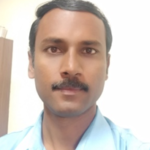
Name of the Speaker: Dr. JayKumar PD (KSRSAC) Title of the Seminar: Karnataka GIS : A tool towards transparent governance [Gallery] Date and Time: 30th September, 2019 (Monday), 4:00 PM Venue: Lecture Hall, ICWaR About the speaker: Dr. Jayakumar P D is a team lead for capacity building division at Karnataka State Remote Sensing Applications Centre, Department of Personnel and Administrative Reforms (e-Governance), Government of Karnataka. He has PhD on Remote Sensing and GIS from Dept. of Applied Geology, Kuvempu University. His research areas include Optical Remote Sensing and GIS applications for natural sector. He has more than 10 years of experience in private, government and research & development sector in geospatial technology. Abstract: Karnataka Geographic Information System (K-GIS) is a flagship program of the state which is visualized as a geospatial technology platform that ensures availability of updated “GIS ready data” of specified standard. It is a novel initiative by the Karnataka State Remote Sensing Applications Centre (KSRSAC) to map and integrate all department asset data and make it available for both government and public through a single gateway i.e., K-GIS Portal (https://kgis.ksrsac.in/kgis/). The datasets are organized and standardized such that they are readily available, easily-usable “integrated” GIS content for the entire state. The major activities of K-GIS are mapping and geo-tagging of departmental and public assets, integration of MIS data and developing GIS based Decision Support System to address the spatial challenges of Government of Karnataka (GoK) departments. Till date more than 18 lakhs asset related information was collected and organized in 350 spatial layers and the activity is growing. By using these spatial data around 40-45 GIS based mobile applications (Ex: Moulya, Dishaank, Chunavana, Data Collector etc.,) and around 50-55 GIS based web applications (Ex: Agriculture Dept, Family Welfare Dept, Education Dept etc.,) were developed and rolled out for department and citizen usage. It has also tailored the departmental applications with GIS content for taking decisions, tracking project implementation, monitoring progress and policy definition. Due to its implementation by GoK, all the government institute/infrastructure data and MIS information is available to the citizens, thus facilitating the Right to Information in a user-friendly manner. The maps are also available as a service to IT enthusiast and researcher to carryout research and development activities. |
|
28 Aug
2019
|
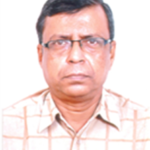
Name of the Speaker: Dr. Dipankar Saha Title of the Seminar: Artificial Recharge – An all-weather solution for Groundwater Crisis or Overrated Panacea? [Gallery] Date and Time: 28th August, 2019 (Wednesday), 4:00 PM Venue: Lecture Hall, ICWaR About the speaker: Dr. Dipankar Saha is a former Member (Head Quarters) Central Ground Water Board, former Member Secretary, Central Ground Water Authority and Head of National Ground Water Training and Research Institute, Raipur He spearheaded the National Aquifer Mapping and Management Programme, as National Coordinator. He obtained PhD on Ground Water Management from IIT- Dhanbad and has authored more than 50 papers in International Peer Reviewed Journals and delivered more than 300 lectures and key note address in national and International Seminars. He is professionally trained from Asian Institute of Technology, Bangkok and from JICA, Tokyo. He represented the country and presented papers in World Bank session at Kathmandu, International Atomic Energy Agency at Ho-Chi Minh City, and Vienna, World Water Week – Stockholm, India-UK Water Security Exchange- Wallingford, Oxfordshire, IAH Congress in Dajeon, Korea. He led the Govt of India Delegation to Myanmar. He remained member of many high level National Committees and has Edited/Co-edited books/Journals, the recent one is Water Governance- Challenges and Porospects published by Springer in 2019. He is the first recipient of National Geoscience Award in 2010 from CGWB as well as first recipient of Excellence in Ground Water conferred by International Association of Hydrogeologist-India Chapter in 2014. Abstract: Groundwater is the lifeline of drinking, irrigation and industrial water supply in India. With an extraction of ~ 250 km3 annually, India are the largest user of Groundwater in the world. Though a plethora of government documents and policy papers highlighting planned and coordinated extraction management of groundwater resources is available, in practice, it has been hardly followed. So is the case of artificial recharge, often referred as medicine of all groundwater woos but mostly being executed in a segmented and unplanned manner often divested with scientific understanding of the area. Groundwater extraction has never been planned in conjunction with its annual recharge. The reason is the lack of structured approach by the Government. We use more than 85% of our extracted groundwater for irrigation through ~ 22 million wells owned by farmers. In absence of any regulatory mechanism, coupled with sops offered by the State Govts, mainly in the form of energy subsidy, has initiated a reckless extraction, creating havoc. The latest estimates reveal that about 20% of the assessment units are either overexploited or are alarmingly close to it. Artificial recharge and rain water harvesting is considered as a panacea for groundwater depletion. The Centre and State Government Departments spend huge public money mainly through various schemes like MNGREGS. The recharge structures are hardly dovetailed with local aquifer understanding, thus lacking in two basic arenas, location and design, and resulting in sub-optimal benefits. The other important issue is the lack of source water, which is primarily monsoon runoff in India. In arid and semi-arid areas, dearth of source water is a major challenge. Inter-basin water transfer should also considered for recharging the depleted aquifer. Moreover, because of climate change, the monsoon pattern is changing. The traditional understanding of types of structures and their designs needs to be revisited to accommodate and withstand high intensity rainfall.There are areas where acute groundwater mining has rendered such a condition that even if all possible recharge measures are successfully implemented and working, the resource would continue to deplete. Such a situation warrants strict direct or indirect regulation of extraction. The NAQUIM outputs are enhancing our knowledge and understanding of the prolific as well as depleted aquifer systems. The time has come to think of mega recharge schemes in hydrogeologically suitable areas. |
|
16 Jul
2019
|
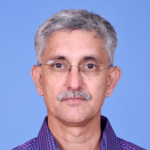
Name of the Speaker: Dr. R D Deshpande Title of the Seminar: Frontiers of Hydrology Research – Role of Isotope Tracer Applications [Gallery] Date and Time: 16th July, 2019 (Tuesday), 4:00 PM Venue: Lecture Hall, ICWaR About the speaker: Dr. R D Deshpande is currently the Chairman of Geosciences Division of Physical Research Laboratory (PRL), Ahmedabad, which is a unit of Department of Space Govt. of India. He has a Ph.D. from the M.S. University of Baroda, Vadodara, based on his isotope hydrology research at PRL. Dr. Deshpande’s research is focused on understanding the complex hydro-geological and hydro-meteorological processes using stable and radioactive isotopes as a tracer tool. His research in the field of Isotope Hydrology is well-known in India and abroad. He carried out a Regional Aquifer System analyses in the North Gujarat Cambay region to explain the temperature and helium anomalies in the groundwater vis-à-vis tectonic frame work of the region. He has explained the origin and distribution of high levels of fluoride in ground waters of North Gujarat and suggested remedial measures against the endemic fluorosis. He has assigned radio-carbon and Helium accumulation ages to ground waters of Gujarat and shown that groundwater being exploited today in the water stressed areas was recharged several tens of thousands of years old. This highlighted the need for artificial recharge and rain water harvesting. He observed for the first time the kinetic isotope fractionation during liquid condensation under supersaturated condition. He has identified the zones of groundwater helium anomalies along the Narmada lineament as a signature of active hydrothermal circulation. Dr. Deshpande is the Principal Coordinator of the National Programme on Isotope Fingerprinting of Waters of India (IWIN) which is a multi-institutional collaborative research programme, aimed at isotopically characterizing various hydrological cycle components (sea surface water, atmospheric water vapor, rain water, groundwater and river water) to understand subtle aspects of interaction and exchange between them. Dr. Deshpande set up a state-of-the-art Isotope Ratio Mass Spectrometer (IRMS) laboratory under the IWIN programme, dedicated for oxygen and hydrogen isotopic analyses of water and vapor samples. His research is based on numerous wide-spread and exhaustive field sampling across the country for collection of samples and their isotopic analyses. He has published more than 40 peer reviewed research papers based on this fieldwork. Dr. Deshpande is nominated as a Mission Expert in Isotope Hydrology by International Atomic Energy Agency (IAEA), Vienna. He has served as a member of the several Expert and Advisory committees of MOWR, MOES and the DST. He is an expert member in the Board of Studies in Geology at M.S. University of Baroda and Research Development Committee of the M.G. Science Institute, Ahmedabad and Kachchh University, Bhuj. He is a Fellow of the Geological Society of India and the Gujarat Science Academy. Abstract: The contemporary hydrology is faced with great challenges of known problems and the greater of unknowns. Problems of water scarcity, anthropogenic pollution, geogenic contamination, dwindling surface flows, inequitable distribution and salinity ingression have turned cliché in hydrology community. The scientific processes underlying these hydrological problems are quite well understood and can be mitigated by appropriate field measures, treatment technologies, improved water use efficiency and policy interventions enforced with strong political will. While we grapple with these known water resource problems, there lies beyond a mind-boggling ignorance about certain aspects of functioning of hydrological systems, their natural course and response to perturbing stimuli. This ignorance about certain hydrological processes does not hinder the ongoing efforts of mitigating existing problems; therefore, it is presently on the back-burner. However, for a fundamental hydrology researcher, this ignorance defines the frontier of research. Filling these hydrological knowledge gaps will become essential in the coming decades to face the imminent scenario. This knowledge gap may seem only academic in nature at present but is bound to have societal implications. Some of the important questions in the above backdrop are: (1) What is the relative contribution of Western Disturbances and Indian Summer Monsoon in Himalayan precipitation, rivers and cryosphere? (2) How are wetlands in Northeast India participating in monsoon rainfall? (3) How to identify signatures of static groundwater being circulated into the surface and atmospheric components of hydrology? (4) How much of submarine groundwater discharge can be tapped without damaging marine ecology? (5) Are there deep sources of self-recharging and self-replenishing groundwater (seawater distillate or otherwise) other than static water? (6) What is the contribution of recycled moisture in Indian precipitation? (7) How to perceive the effect of varying Himalayan riverine influx in the Bay of Bengal? (8) Can the Bay of Bengal surface water cool below threshold temperature for feeding moisture? These and many more questions define the frontier of basic research in hydrology which can be defined only by multitude of tools and expertise in conjunction with each other. Isotope application is one such tool which can play an important role in this basic research pursuit. Progress hitherto and the possibilities will be discussed in the seminar. |
|
26 Jun
2019
|
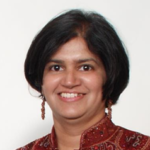
Name of the Speaker: Dr. Veena Srinivasan Title of the Seminar: India’s Water Crisis: Bridging the Science-Policy-Practice Gap [Gallery] Date and Time: 26th June, 2019 (Wednesday), 4:00 PM Venue: Lecture Hall, ICWaR About the speaker: Dr. Veena’s research interests include inter-sectoral water allocation and conflict transformation, impacts of multiple stressors on water security, ground and surface water linkages, low-cost sensing and citizen science, and sustainable water management policy and practice. More recently, she has initiated work on Bangalore’s lakes with the goal of understanding how lakes can contribute to water security as well as creating a citizen’s dashboard, which synthesizes data from low-cost sensors and citizen scientists to help manage urban lakes better. Dr. Veena is in the leadership team of the Panta-Rhei initiative of the International Association of Hydrologic Sciences (IAHS). She was recently appointed to the Strategic Advisory Group of the task force for Monitoring SDG6 by UN-Water. Dr. Veena has served as a resource person for National Water Mission, and serves on the Steering Committee of the Water Conflicts Forum in India. Dr. Veena has won several awards for her research including the 2015 Jim Dooge Award for best paper in the Journal of Hydrology and Earth System Science from the European Geophysical Union, the 2012 Water Resources Research Editor’s Choice Award from the American Geophysical Union. She has received an Editor’s citation for excellence in reviewing for the Journal of Water Resources Research in the years 2016 and 2017. She is the current chair holder of the prestigious Prins Claus Chair in Netherlands from 2018-2020. She has also been invited to be an IUGG Union Lecturer in 2019. She has been a recipient of the Teresa Heinz Environmental Scholars Award, a Presidential Graduate Fellowship at Boston University as well as the government of India’s National Talent Search Scholarship. Veena received her PhD from Stanford University’s Emmet Interdisciplinary Program in Environment and Resources (E-IPER). Dr. Veena holds a Masters in Energy and Environmental Studies from Boston University, Massachusetts and a B-Tech in Engineering Physics from the Indian Institute of Technology, Bombay. Abstract: India is one of the most water-stressed countries in the world. However, despite an appreciable increase in funding for water research, high-quality science, that is usable by stakeholders remains elusive.There is an urgent need for “use-inspired” research on questions that actually matter to stakeholders, trans-disciplinary research, and empirical primary data on fundamental science questions. But what does such research entail? What do we understand, what questions still remain to be answered? Finally, how does science actually translate into policy and practice? What are the policy levers or game changers and how do we ensure that scientific research actually informs efforts to adopt them. |
|
29 May
2019
|
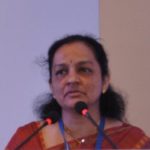
Name of the Speaker: Dr.Purnima Jalihal Title of the Seminar: Desalination – Technical challenges and Road Ahead Date and Time: 29th May, 2019 (Thursday), 4:00 PM Venue: Lecture Hall, ICWaR About the speaker: Dr. Purnima Jalihal is a senior scientist who heads the Energy and Fresh Water group in the National Institute of Ocean Technology, India. She has coordinated many first – ever projects in ocean energy and desalination. She has jointly coordinated the world’s first ever ocean thermal gradient based desalination plant at Kavaratti island in the Lakshadweep group in the Arabian Sea which has helped transform the lives of the small island community which had a serious lack of drinking water. For this work she was awarded the Vishwakarma Medal in 2006 by the Indian National Science Academy. This success led to more plants in islands and a demonstration plant offshore. Dr. Purnima is now attempting to scale up the technology and power such plants using ocean renewable energies. She has several firsts in the area of ocean energy as well, including a wave powered desalination system at Kerala, a wave powered navigational buoy and a hydrokinetic turbine. Her areas of specialization include offshore structures, floating and structural dynamics, renewable ocean energies and desalination.She has MS and PhD degrees in Civil Engineering from Duke University , USA. She is currently working on a large scale desalination project at Tuticorin thermal power station using the condenser reject heat and a self powered thermal desalination at Lakshadweep using the power generated from the temperature gradient. Additionally, she played a pivotal role is getting Cabinet’s approval for India to become Member Country of the International Energy Agency’s Ocean Energy Systems (IEA-OES) Technology Collaboration Program (TCP) with the NIOT as the participating agency in 2016 and held the first Ex Co meeting in India in November 2017. Abstract: The current scenario where water stress dominates most of the regions in India warrants new technological solutions for fresh water generation. Desalination has been on the horizon for some decades now due to large plants in the Gulf. There are several types of desalination methods predominantly thermal and membrane based. The technical challenges include proper methods for intake and discharge of seawater, optimization of thermodynamic parameters for thermal systems, chemicals and bye products for membrane methods and energy requirement optimization. The location, water quality and environmental impact and other parameters like availability of steam all need to be considered for appropriate selection of the desalination method. Desalination of brackish water as well as seawater promises to be a good solution to the water crisis. Desalination methods are energy intensive and towards lower carbon footprint, use of renewable energy forms need further exploration and development. Cost and energy reduction for thermal technologies and safe disposal of by products for membrane methods is the need of the hour. |
|
25 Apr
2019
|
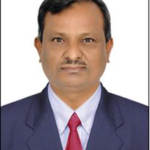
Name of the Speaker: Dr. G S Srinivasa Reddy (KSNDMC) Title of the Seminar: Drought Monitoring System in Karnataka Date and Time: 25th April, 2019 (Thursday), 4:00 PM Venue: Lecture Hall, ICWaR About the speaker: Dr. G S Srinivasa Reddy is currently serving as Director in Karnataka State Natural Disaster Monitoring Center (KSNDMC) since January 2015. He had his Masters and PhD degree from Department of Geology from Bangalore University. He has joined this organization during 1991 as a scientist and served as scientific officer in KSNDMC from 2008-2015. His area of specialization is Hydro-Geology, Geo Technology, Ground Water Hydrology, Surface Water Hydrology and Agro –Meteorology. He is serving as a member of Geological Society of India. He is also a member in state level Weather Watch Committee, state level Co-ordination Committee for Crop Insurance, state level Technical Committee on Sujala Watershed and Technical Committee on Climate Change Initiatives (EMPRI). He is a member of Karnataka State Disaster Management Authority, Technical committee of Karnataka State Ground Water Authority, general body of Karnataka Science and Technology Promotion Society (KSTePS), Expert Committee for Cloud Seeding Operations in Karnataka and State Ground Water Co-ordination Committee (SGWCC). He is serving as member in Technical Committee for issue of crop advisories in Karnataka State, Technical Committee on Interstate Water Disputes and Technical Committee to implement National Cyclone Risk Mitigation project. Abstract: Karnataka state is highly vulnerable to drought. In the last 13 out of 16 years (2002-2018), most parts of Karnataka has been subjected to severe drought. The successive drought condition has resulted in shortage of water for drinking, irrigation, etc. Also, groundwater levels are depleting and quality of water is getting deteriorated. |
|
29 Mar
2019
|
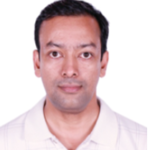
Name of the Speaker: Prof. Bharadwaj Amrutur Title of the Seminar: Challenges for City Scale Multi-Sensor Anlaytics Date and Time: 29th March, 2019 (Friday), 4:00 PM Venue: Lecture Hall, ICWaR About the speaker: Dr. Bharadwaj Amrutur is a Professor in ECE Department and Chairs the Robert Bosch Centre for Cyber Physical Systems, IISc Bangalore. After completing his B.Tech in Computer Science and Engineering in 1990 from Indian Institute of Technology, Bombay, he did his M.S. in Electrical Engineering in 1994 from Stanford University, USA. Thereafter, he pursued his Ph.D. in Electrical Engineering in 1999 from Stanford University, Stanford, CA, USA. Abstract: Cities and Utilities have started deploying connected sensors as part of their smart cities effort. Examples include pollution sensors in Pune, water sensors by BWSSB, smart electricity meters, smart water meters etc. However there is still a large gap in terms of general understanding of how to do this deployment in the most cost effective manner, while extracting the maximum value out of the data. He discussed some of the technical gaps in sensor fabrication, sensor calibration, deployment optimization, data access and multi-sensor analytics and talked on some of his team’s ongoing work in the context of air quality sensors and pilot activities in Pune and Electronics City. |
|
20 Feb
2019
|

Name of the Speaker: Dr. Sharachchandra (Sharad) Lele Title of the Seminar: Reforming Water Governance: Philosophy, Hydrology and Institutional Analysis Date and Time: 20th February, 2019 (Wednesday), 4:00PM Venue: Lecture Hall, ICWaR About the speaker: Sharachchandra (Sharad) Lele got a B.Tech. in Electrical Engineering in IIT Bombay (1984) but then decided that environmental studies were more exciting and socially relevant. So, he did an M.S. on the environmental impacts of large dams at the Indian Institute of Science, Bangalore (1987) and then a Ph.D. in Energy and Resources from the University of California, Berkeley (1993), focusing on forest use in the Western Ghats. Abstract: Karnataka, like most of the peninsular states in India, is facing a serious water crisis. Basins have closed, groundwater is depleting, baseflows have dried up, and existing water is being inequitably distributed. Conventional responses tend to be supply side, lacking an integrated hydrological understanding, and top-down. A paradigm shift is required in multiple dimensions: the normative goals, the world view, the hydrological underpinnings and the institutional arrangements. He discussed the rationale and key elements of such a paradigm shift and make a case for using an interdisciplinary value-based framework for all efforts in reforming water governance. |
|
01 Jan
2019
|

Name of the Speaker: Dr. Aditi Bhaskar Title of the Seminar: Effects of Urban Development on Streamflow Date and Time: 1st January, 2019 (Tuesday), 4:00 PM Venue: Lecture Hall, ICWaR About the speaker: Dr. Aditi Bhaskar is an Assistant Professor in the Department of Civil and Environmental Engineering at Colorado State University. She specializes in changes to hydrologic systems from urban development, with a focus on interactions between groundwater, streams, stormwater, and landscape irrigation. She recieved her Ph.D. in Environmental Engineering from University of Maryland, Baltimore County. Abstract: Urban development consists of a collection of processes that have variable effects on water budgets, groundwater recharge, and stream flow flow. Some of the processes that were focused on in this seminar are infiltration of storm water, changes to evapotranspiration, lawn irrigation, water supply pipe leakage, impervious surface cover, and infiltration of groundwater into wastewater pipes. The methods used to investigate these drivers of urban base flow have been data analysis, field data collection, and mathematical modeling. Watershed-scale storm water infiltration was implemented as part of low impact development in a watershed that was converted to suburban development in Clarksburg, Maryland, USA. Stream base and total flow both were found to increase during development, relative to flow in reference urban and forested watersheds. The driving processes are suggested to be a reduction in vegetative cover and evapotranspiration, and an increase in focused groundwater recharge with watershed-scale storm water infiltration. In Baltimore, Maryland, USA, water supply pipe leakage and impervious surface cover were found to be less important drivers of subsurface storage compared to infiltration of groundwater into wastewater pipes. Current work on drivers of urban base flow focusing on semi-arid areas were discussed. |
